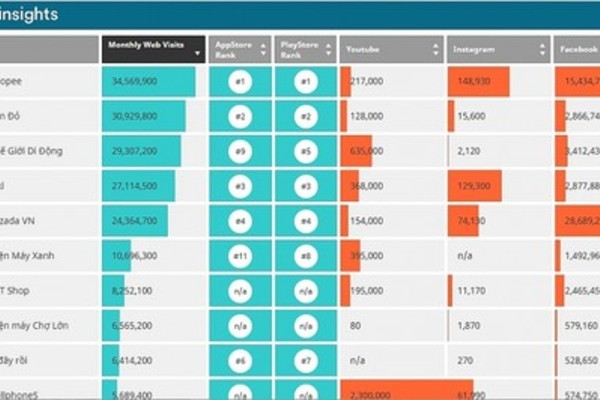UPS, the global shipping service provider, has launched eFulfillment, a service that allows sellers in Vietnam to manage many e-commerce channels simultaneously.

With e-Fufillment, businesses can streamline the process of updating items, storing goods, and packaging, shipping and watching over the shipping process on many e-commerce channels. Thanks to the platform, businesses, especially small and medium sized, can develop and expand their market share.
Prior to that, in September 2019, UPS Worldwide Express Freight was set up in 24 cities/provinces in Vietnam. It applies to pallet shipments of over 70 kilograms.
According to Russell Reed, CEO of UPS Thailand and Vietnam, the US is now Vietnam’s leading export market, and with 96 percent of consumers in the US buying/selling goods online on e-commerce channel.
| The Internet boom, a young labor force and the strong development of e-commerce all help Vietnamese businesses access foreign markets, especially now that many next-generation FTAs have been signed. |
“We want to help Vietnam’s small and medium enterprises continue expanding business scale and increase access to goods,” he said.
Meanwhile, Fado has signed a cooperation agreement with Alibaba on helping Vietnamese enterprises approach new markets via Alibaba marketplace. Fado’s CEO Pham Dat said via Alibaba.com, Vietnam’s enterprises can advertise their products to 260 million businesses in 240 countries and territories.
After making registrations on Alibaba’s B2B trading floors, businesses can offer goods, search for customers, place orders, sign contracts and make payments through this system. Alibaba also helps businesses find the products they need and the suppliers.
Similarly, Amazon from the US is also attracting Vietnam’s businesses to sell products. Vietnam’s import/export value reached $482 billion in 2018, according to the General Department of Customs (GDC). The export turnover is expected to increase once small and medium enterprises have opportunities to export their products directly via Alibaba.com and Amazon.com.
Cross-border e-commerce has become an important channel for export, according to the Vietnam E-commerce Index Report. Thirty two percent of Vietnam’s small and medium enterprises have established business relations with foreign partners through online channels.
By joining B2B e-commerce platforms, enterprises will have the opportunities to directly approach customers around the world, thereby expanding opportunities to access the global market and reduce costs as they don’t have to spend money on promotion campaigns through fairs, exhibitions and office setup in the target markets.
According to the head of the Vietnam Trade Promotion Center Vu Ba Phu, cross-border e-commerce would surge to $3.3 trillion in the next two years. Therefore, exporting products via e-commerce will be useful for businesses to obtain orders quickly.
At present, only 12 percent of Vietnam’s small and medium enterprises sell goods on e-commerce platforms.
Mai Lan

Multi-billion dollar capital flows to e-commerce in Vietnam
The multi-billion dollar capital flow which went to India and helped the country build decacorns (startups with value of over $10 billion) and unicorns (over $1 billion) in e-commerce, is now heading for Vietnam.

Lazada and Tiki fall further behind e-commerce competition
Despite non-stop spending, Lazada remains overwhelmed by local platforms Sendo and Mobile World, in addition to other players Shopee and Tiki.
 The Internet boom, a young labor force and the strong development of e-commerce all help Vietnamese businesses access foreign markets, especially now that many next-generation FTAs have been signed.
The Internet boom, a young labor force and the strong development of e-commerce all help Vietnamese businesses access foreign markets, especially now that many next-generation FTAs have been signed.